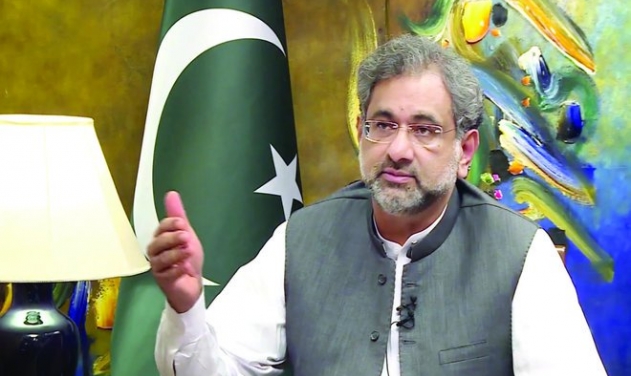‘Training elements, not fighting force being sent to Saudi Arabia,’ PM Abbasi clarifies

ISLAMABAD, FEB 23 (DNA) – Attempting to clear the air on Pakistani troops being sent to Saudi Arabia, Prime Minister Shahid Khaqan Abbasi has said that “training elements” rather than fighting forces are being sent to the Kingdom.
“The reality is very different from the perception,” the prime minister said in an interview aired on Thursday on. “There is no deployment from here. No force is going to attack anyone over there.”
Last week, a press release by the Inter-Services Public Relations (ISPR) saying that a Pakistan Army contingent would be stationed in Saudi Arabia on a “training and advisory mission” had fuelled fears of Pakistan being sucked into the Yemen conflict.
He said that Pakistani forces have been present in Saudi since the past forty years for training purposes and that the recent send-off was also a part of the same procedure. “Some personnel go and some come back. Sometimes they are less and more at other times. This is routine practice. There is nothing new.”
He categorically denounced the perception of a large contingent being sent and planning of an attack on Yemen.
Abbasi also asserted that the parliament would be provided with any details of the troops being sent. “Any details asked for will be provided,” he asserted, adding: “Defence minister has given a clear statement in the Senate and if the house feels, I will also give one.”
Need for dialogue on institutional tension
Asked about his speech in the National Assembly about the need for a debate in parliament on who has the final say in legislation, Abbasi said that the issue should have been settled decades ago but had persisted because of breaks in democracy in the country.
“The role of every institution is defined in the constitution and whenever an institution exceeds its authority, it will be doing so at the cost of another institution. Now we are seeing that the legislature and the executive are being affected [by court decisions].
“It is said in court that ‘we will reject laws made by the parliament’; discouraging remarks are made for parliamentarians by the court. Other than that, appointments are challenged and officials are removed and humiliated. Government officials are called to the court and are asked irrelevant questions,” he said about recent court hearings.
“In this situation the easiest thing for a government official is to do nothing because no matter what you do, you will be questioned on by the court.”
“Mistakes do happen and they do have consequences in terms of losses or benefits. But it is the domain of the executive. The responsibility to deliver at the end of the day is with the executive,” he said. “No one is going to ask the judiciary about why the work was not done.”
He said these were the reasons debate had become necessary to decide “whether the parliament is sovereign on not, what is the domain of the executive and whether the parliament can make laws.”
He concurred with Chairman Senate Raza Rabbani’s suggestion for an intra-institutional dialogue.
I do not see justice happening
Abbasi also criticised court actions against the former prime minister Nawaz Sharif, asserting that the former PML-N president did not have any corruption charges against him.
“Who [else] has to appear twice before the courts every week?”
“Show me another NAB case where there have been two, or even one hearing every week. Is there only one case that is left in Pakistan?” he asked, citing other cases where even charges have not been framed despite evidence of corruption being presented in the court years ago.
“I do not see justice happening. People are not accepting it. This is an alarming situation.”
“There is no charge of corruption against Nawaz Sharif,” he said. “What are you prosecuting? This is not prosecution but persecution.”
He also asked the judiciary to tread carefully when making important decisions.
“The judiciary should keep an eye on decisions which have no legal precedent, which will not be accepted by history or by the people.”
“There have been decisions by the courts which have made us liable to pay billions of dollars and we have no appeals over them,” Abbasi said.
Related News

Pakistan, Russia Sign Protocol to Revive Steel Mills
MOSCOW, JULY 11 (DNA):Pakistan and Russia have signed a Protocol to restore and modernize PakistanRead More

President urges communities’ role, inclusive policies to tackle population growth challenge
ISLAMABAD, Jul 10 (APP/DNA):****EMBARGOED TILL 2359 HRS TONIGHT* As the world observes World Population DayRead More


Comments are Closed